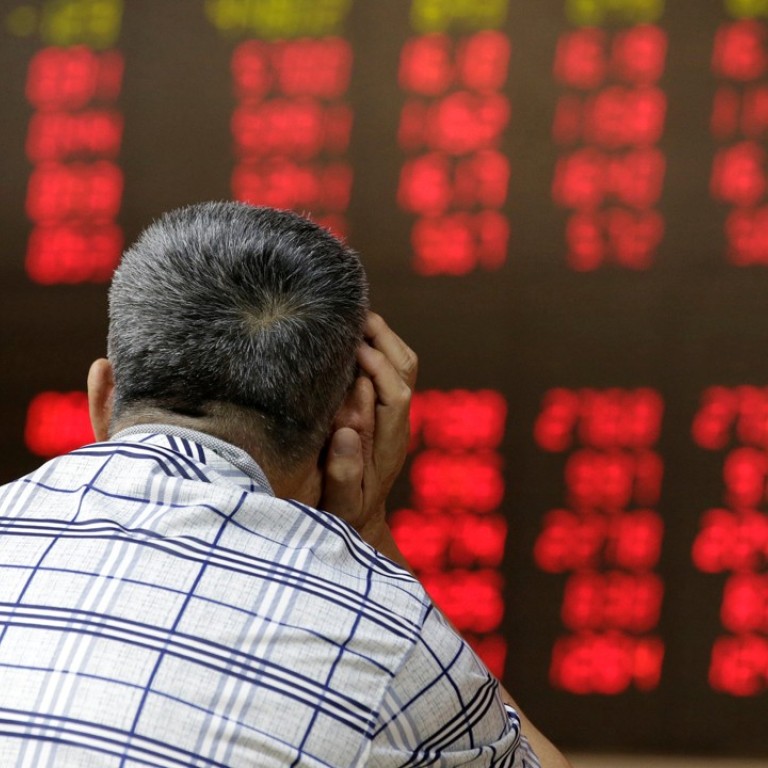
China’s CSI 300 Index closes at 17-month high after MSCI inclusion
Companies due to be included in MSCI’s emerging-markets and global index led the gains. Hang Seng Index slips 0.1 pc to 25,674.53
Mainland China’s CSI 300 Index rose to a 17-month high on Thursday, extending a rally after global index compiler MSCI decided to add yuan-traded equities to its benchmark indices for the first time.
The gauge of big-capitalisation companies, which covers an 80 per cent weighting of the 222 stocks that will be added to MSCI’s emerging markets benchmark, gained 0.1 per cent, or 2.38 points, to 3,590.34 on Thursday, the highest close since December 2015. Gains in the CSI 300 Index slowed in the afternoon from Wednesday’s 1.2 per cent increase.
The Shanghai Composite Index added 0.3 per cent, or 8.76 points, to 3,147.45. Hong Kong shares fell for a third day.
“Buying sentiment is pretty focused on the MSCI-linked plays as it’s a very new and has attractive theme for domestic investors,” said Wei Wei, a trader at Huaxi Securities. “The interest in the 200-plus stocks will carry on for another week.”
The inclusion, which starts next year, will represent a tiny weighting of 0.73 per cent of the emerging-markets index, and is expected to bring about US$18 billion of inflows into China’s equity market as global fund managers add A-shares into their portfolios because they track the MSCI EM index,
Buying sentiment is pretty focused on the MSCI-linked plays as it’s a very new and attractive theme for domestic investors
The weighting could increase over time if China implements more market reforms, and a full inclusion of mainland stocks into MSCI indexes could take place between five and 10 years that may eventually bring US$400 billion of funds into the mainland, according to analysts.
The Chinese securities regulator is mulling further measures that will improve the accessibility of the nation’s stock market for overseas investors to accommodate MSCI’s inclusion, according to state television.
The government may raise the daily quota system of the current exchange link programmes and reform the current qualified foreign investor, or QFII, scheme, Fang Xinghai, vice chairman of the China Securities Regulatory Commission, said in an interview with China Central Television on Wednesday night. But derivatives linked to Chinese equities traded overseas will still be subject to the regulators’ approval, he said.
Companies due to be included in MSCI’s emerging-markets and global index led the gains. Beijing Shiji Information Technology surged by the 10 per cent daily limit to 22.77 yuan (US$3.33) in Shenzhen and Alpha Group surged 8.9 per cent to 17.59 yuan. Shandong Linglong Tyre gained 6.7 per cent to 21.89 yuan in Shanghai and China Merchants Bank jumped 6.7 per cent to 22.73 yuan.
China Pacific Insurance advanced among insurers on optimism the government will support the development of commercial pension insurance products. Insurance companies are urged to speed up the trial of individual tax-deferred commercial retirement products , Premier Li Keqiang said in a cabinet meeting on Wednesday.
China Pacific advanced 3.0 per cent to 33.21 yuan in Shanghai. New China Life rose 2.2 per cent to 50.49 yuan and China Life Insurance added 2.5 per cent to 27.46 yuan.
The recent gains in mainland Chinese shares have widened the premium over Hong Kong stocks to the biggest level in six months, according to an index compiled by the Hang Seng Bank to track the price differences between the two markets. Yuan traded equities are now 25 per cent more expensive than stocks trading in the former British colony, the data showed.
Hong Kong markets were mixed, with the Hang Seng Index slipping 0.1 per cent, or 20.05 points, to 25,674.53 and the Hang Seng China Enterprises Index gaining 0.1 per cent, or 9.17 points, to 10,402.76.
Gaming and software led losses. Melco International slid 1.4 per cent to HK$20.90 and Galaxy Entertainment slipped 0.3 per cent to HK$47.95. Computer and Tech fell 1.0 per cent to HK$2.94 and Feiyu dropped 1.0 per cent to HK$0.97. Automobiles were also among losers, with Greatwall motor sliding 1.6 per cent to HK$9.92 and BYD dropping 1.4 per cent to HK$48.30
Trading in China Household Holdings shares was halted pending release of a clarification announcement in relation to a recent research report.


